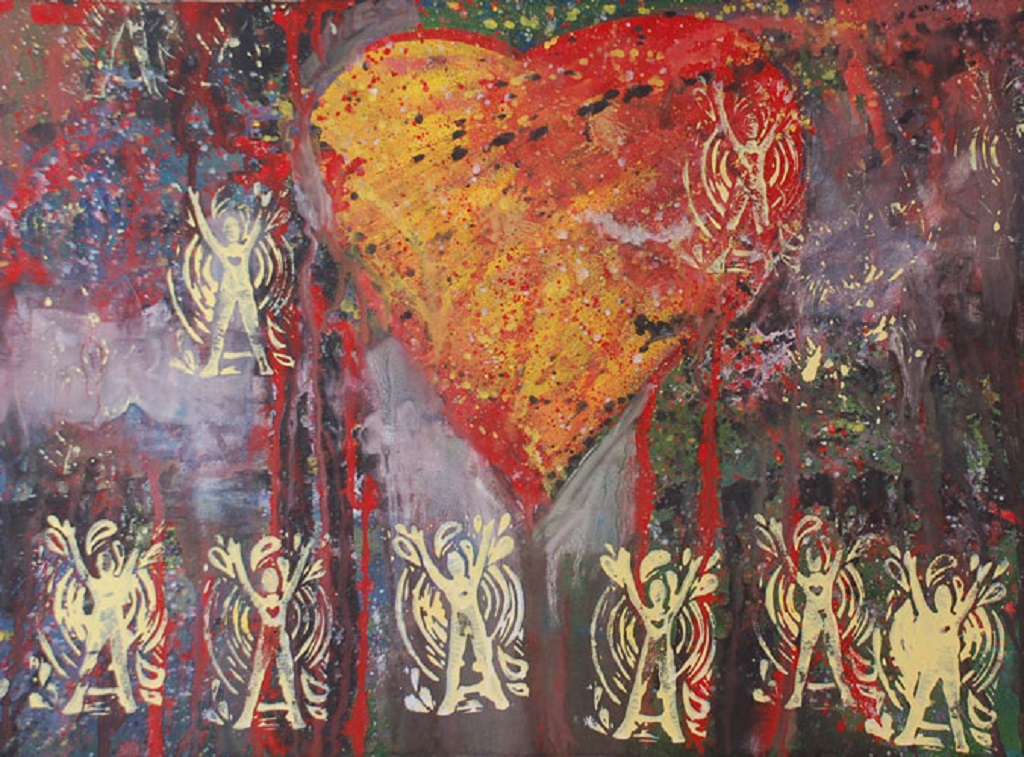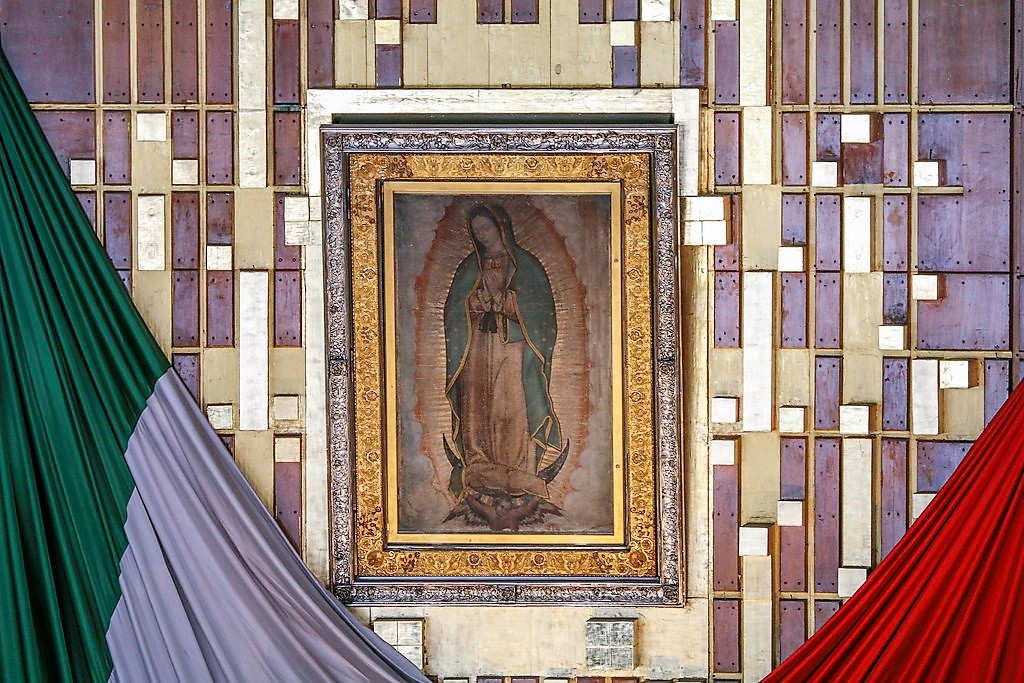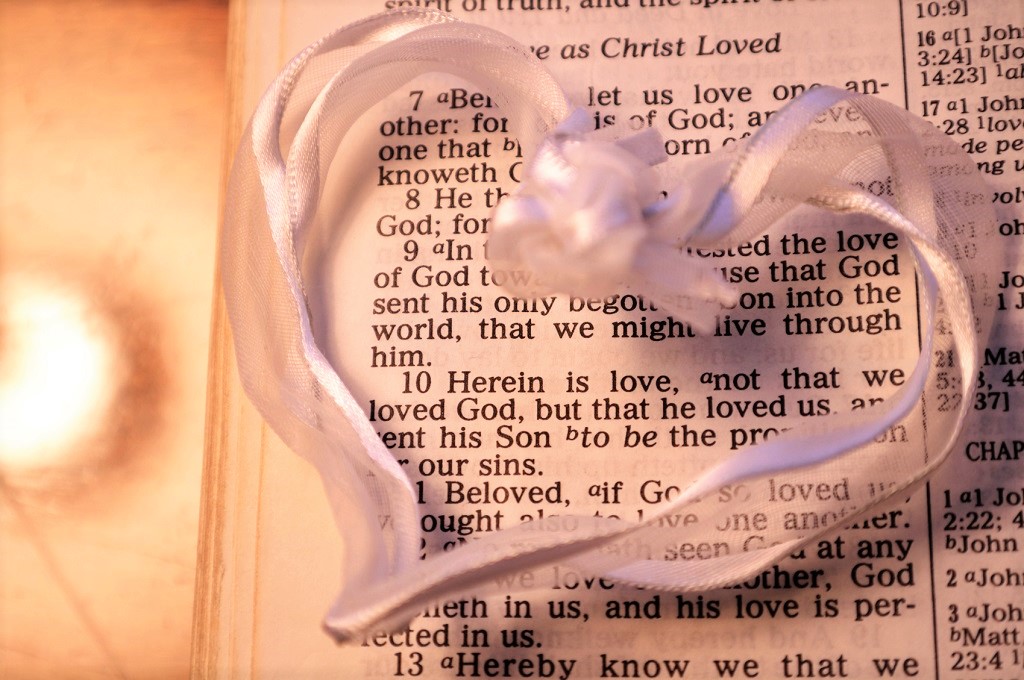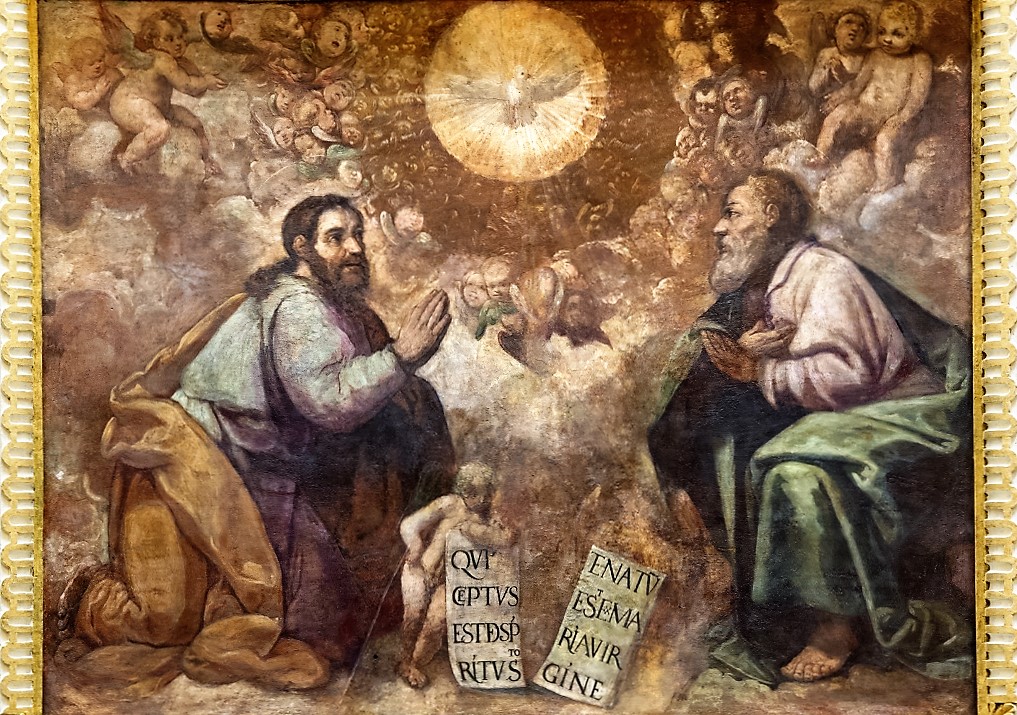Listen, O Israel!
There is hardly any Christian or even non-Christian who has not heard the two main commandments of the Christian faith: love God and love your neighbor. I am not sure people would say it exactly in that order, but if we were to ask our contemporaries how they would sum up the requirements of Christianity, more or less that’s the kind of answer we would get.
Today’s Gospel reading provides us with a version of it: The first is this: Hear, O Israel! The Lord our God is God alone! You shall love the Lord your God with all your heart, with all your soul, with all your mind , and with all your strength. The second is this: You shall love your neighbor as yourself (Mk 12:29-31)
The first and most important thing to notice in Jesus’ answer to the scribe’s question is what most people overlook. It is something we easily slip over when we mention this two-fold commandment: “Hear, O Israel! Shema, Israel!” Have we noticed that the ten commandments actually start with this first invitation, like a necessary prelude, almost a commandment in itself? It is a solemn request, coming from God.
Listening to God, therefore, is like a pre-commandment: a condition, a mindset we have to come to in order to fulfill the commandments that follow. Listening becomes the key to understanding their true nature. How can there be love of God “with all your heart, with all your soul, with all your mind and with all your strength” if you do not first welcome God through the gate of your inner ears, of your heart? How can I love someone I do not know? Someone I have not encountered? Someone I have not listened to?
Furthermore, it is through deep listening to God, especially in prayer, that God enables us to love him and our neighbor with such total love. In my spiritual journey, I have found that one of the most recurrent obstacles in spiritual life – both for Christians who struggle to go deeper and for non-Christians who are attracted to Christianity – is this kind of thought: “This is all great, but it’s just a lofty ideal! Who can attain this perfect love demanded of me? God’s commandments are beautiful but they are too hard to live out.” People give up. Who needs one more burden in our already busy and complicated life? One more heavy requirement? The truly sad spiritual truth is that we give in to this false image of a very demanding God. It is an idol we may inadvertently worship.
If you think about it, a God who is only demanding – or simply demanding first and foremost – would be an unjust God. God cannot be unjust, not only because that would contradict his very nature, but because he is a Father. No good father or mother would first and foremost demand something of their children, without giving first! The very fact of the children’s existence is proof that first comes love, the gift. The children wouldn’t exist had not mom and dad loved each other in that way that is a total gift of self, not just of heart but of body as well, open to the Creator’s gift of life. First comes the gift, then comes the requirement. First comes Love, then the response of Love to that first gratuitous Love. “If you then, who are evil, know how to good give good things to your children, how much more will your Father who is in heaven give good things…” (Mt 7:11)
Too many Christians live their faith with a kind of underlying disappointment of not being able to live up to the requirements of the Faith. How does this burdensome feeling measure up against the Christian Faith as “Good News?” Could Christ have come only to make us feel worse? Unhappier? Could He have brought only more burdens to place on our shoulders? Where is the “Good News” then? “Here I am, stuck in my poverty, with my own limits, while God is far away, as lofty in the high heavens as his commandments.” Who needs this kind of faith? How can we evangelize the world if we live under such a burden? The world needs someone to free them from their burdens, not to add more.
The answer to this dilemma is that we develop a spiritual life in which God is the Giver, that the gift comes first. Grace enables us to live out the commandments; this becomes “our daily bread.” In today’s responsorial psalm God says: “I relieved his shoulder from the burden” (Ps 81:6). God relieves us from our burdens by means of our listening. When we open our hearts to him in prayer, our inner ears to his Word, that is when we are made able to totally love God and our neighbor as ourselves.
“Listen, O Israel” is therefore the key, the gateway to living the commandments. The Father seems to say to us, his sons and daughters, in the gift of the Commandments: “If you listen, my son, if you open wide your ear to my words, I will dwell in you through my only begotten Son, my Word. And the Word will transform you so that you may become my image and likeness, perfect love.”
Will you look at the Father from now on through these eyes? Will you pray in this way from now on? Will you see in listening to him the very way to living out his love?
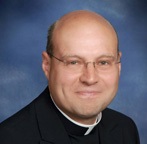 Fr. Peter Damian, 38, is a native of Romania. Growing up under Ceausescu’s Communist regime, in a Christian Orthodox family, he became Catholic at age 19 after a deep search for Truth. Providence took him to Italy, where he attended seminary in the Diocese of Massa Carrara-Pontremoli, followed by post-seminary studies in Rome, at the Pontifical Lateran University. He was ordained a priest on April 2nd, 2005, the very same day St. John Paul II went to Heaven.
Fr. Peter Damian, 38, is a native of Romania. Growing up under Ceausescu’s Communist regime, in a Christian Orthodox family, he became Catholic at age 19 after a deep search for Truth. Providence took him to Italy, where he attended seminary in the Diocese of Massa Carrara-Pontremoli, followed by post-seminary studies in Rome, at the Pontifical Lateran University. He was ordained a priest on April 2nd, 2005, the very same day St. John Paul II went to Heaven.
After 8 years of priestly service in Italy, he felt called to serve God in the Diocese of Grand Rapids, Michigan. He currently serves as Associate Pastor at Our Lady of Consolation Parish in Rockford, MI. Fr. Damian has worked in priestly formation and co-directed spiritual retreats in the Ignatian tradition. He enjoys integrating his formation with studies in Spirituality, Catholic Social Teaching, ecumenism, foreign languages and aviation.
The Greatest In Heaven
We are half-way through Lent – Ash Wednesday was three weeks ago! So as we review these readings we see that they are providing us with teaching to ready our hearts for the extraordinary events related to Easter.
Throughout the readings today are the themes of wisdom and commandments and laws. In the first reading from Genesis, Moses advises the Israelites (and us!) to follow the statutes and laws – that is the wise thing to do. He emphasizes the wisdom and intelligence of this but, of course, it always comes down to our choice. The decisions are always ours – we have been granted free will. Of course, we don’t always reflect wisdom with our choices. Too often we allow the daily temptations to influence us clouding the wisdom of better decisions.
The concept of free will has always fascinated me – why are we allowed to make such poor decisions? Wouldn’t it be easier if we were “programed” to just make the right decisions? Then . . . I thought of my children – grown adults now – but my desire is still that they make “right” decisions. I’ve always wanted them to be guided toward those decisions but to come to them on their own. I can give rules, share wisdom and experiences, but in the end the choice is theirs. I would not want them to be robotic without the ability to think, to reason, to want to make the right decisions. So when I consider all of us as children of God, the same thoughts hold true. It is much more meaningful to make the “right” decisions on my own just as it is to freely embrace God, to accept Jesus as my Lord and Savior on my own volition than to be forced or coerced into those beliefs. It is left to us to decide, knowing the consequences and rewards.
Our gospel is one that we heard on a Sunday a couple of weeks before Lent started. It continues the themes of following laws/commandments. Jesus points out that He did not come to abolish the laws. Rather He is here to fulfill the prophets. He reviews our obligation to follow the commandments. Jesus warns us that those who break the commandments are called least in the kingdom of heaven as are those who cause others to do so. Conversely, those who follow the commandments will be called greatest in the kingdom of heaven. In the next few verses, Jesus explains this further. The challenging part for us now is that as Jesus explains the following of these, He takes it beyond the literal meaning. Few of us will be guilty of killing another, however, who among us can say they have never been angry with another or treated them in a way that was harmful either physically or emotionally.
Jesus really ups the stakes in His discussion of the commandments as He provides guidance in directing us as to the handling of such situations. Clearly, we are to atone by making amends to others. I think about the angels’ proclamation of Peace on Earth – we frequently forget that it was concluded with toward people of good will. So that is how we are to live: as men and women of good will – not being drawn into the myriad of temptations that await us every day. He advises us to control our bodies and to not allow some of our senses or actions to lead us to a sinful path. His last admonition is to be truthful – Let your ‘Yes’ mean ‘Yes,’ and your ‘No’ mean ‘No.’ Anything more is from the evil one. This is in accord with what Moses said in the first reading to follow the statutes and directives While this reading is earlier in Matthew, it certainly lays the groundwork for when Jesus discusses the most important commandments – all of these rules and laws summarized in one phrase: Love your neighbor as yourself. Such a simple phrase and one that challenges all of us and has since the beginning of time. Even as we think of Jesus’ first statement in this reading about not coming to abolish the commandments, we can see that in the early writings and rules as found in Leviticus, we were commanded to . . . not seek revenge or bear a grudge against anyone among your people, but love your neighbor as yourself.
Bottom-line . . . it hasn’t changed; that is still our directive!! Lent and our preparation for Easter is a perfect time to reflect upon this and give it a try!!
 Author Nancy Shirley is a grateful child of God, wife, mother, nana, and nursing professor. My husband and I met at church and have walked this extraordinary journey together experiencing CEC in 2004 and growing more committed to our beliefs. In addition to my husband, I am blessed with a wonderful daughter and son, who in turn are blessed with wonderful spouses. My son’s four children bring us all endless joy and delight. I am on the faculty at Creighton having taught nursing here from 1980-1989 and returning “home” in 2003 to teach nursing at all levels and to administer the undergraduate program. [Today’s reflection is used with permission from Creighton University.]
Author Nancy Shirley is a grateful child of God, wife, mother, nana, and nursing professor. My husband and I met at church and have walked this extraordinary journey together experiencing CEC in 2004 and growing more committed to our beliefs. In addition to my husband, I am blessed with a wonderful daughter and son, who in turn are blessed with wonderful spouses. My son’s four children bring us all endless joy and delight. I am on the faculty at Creighton having taught nursing here from 1980-1989 and returning “home” in 2003 to teach nursing at all levels and to administer the undergraduate program. [Today’s reflection is used with permission from Creighton University.]
Art by Gwen Meharg.
Are You Strangling Yourself With Worry?
Can any of you by worrying add a single moment to your life-span?
Why are you anxious about clothes?
Learn from the way the wild flowers grow.
They do not work or spin.
But I tell you that not even Solomon in all his splendor
was clothed like one of them.
If God so clothes the grass of the field,
which grows today and is thrown into the oven tomorrow,
will he not much more provide for you, O you of little faith?
The Gospel for the 8th Sunday of Ordinary Time has Jesus being practical: Why are you worried? God is in control. Your faith should be in Him alone, and that should give you peace of mind.
We know how hard this is. If you’re a parent, you know that, from the moment you become a parent, you view the world as an incredibly dangerous place. Everything becomes a potential hazard: Lock up all the sharp knives! Make sure the car seat is properly installed! And it seems to get worse as your child gets older: Driving?? Who thought teens driving was a good idea?!
Maybe you are constantly worried about money, or lack thereof. Perhaps the political climate has you on edge. Or are you worried about your job? Our lives seem to become a constant battleground of worry and faith, of anxiety and peace.
The word “worry” has its roots in the Old English meaning, “to strangle.” This seems accurate: we want the control of taking our worries by the throat, so to speak, but they always seem to get the better of us, and we end up getting strangled! And this turnabout is one that leads to spiritual death: our constant worrying becomes an obsession, forcing out faith and replacing it with fear.
Christ does not want us to live a life of fear. He wants us to have lives rooted in faith, hope and love. Fear destroys this, if we let it. It’s easy to disregard this Gospel passage as sort of a “self-help” Christian advice column, but that is far too simplistic. Christ’s Good News is that the very worst that this world has to offer (sin and death) no longer have a hold on us. They can no longer strangle us, if you will. Christ drives out all fear, all death, all hopelessness. Instead, He brings us hope. He brings us peace of mind. He brings us eternal life.
On the Sixth Day of Christmas
On the sixth day of Christmas my true love gave to me, six geese a’laying
The number six is meant to represent the six days of Creation.
Today, we turn our prayerful attention to the Holy Family. It would be easy to dismiss the Holy Family as some sort of fairty-tale creation, a house where no one ever gets angry or raises a voice, where chores are always cheerfully done and there is no such thing as illness or suffering.
That would be wrong.
True, the Holy Family consisted of the Second Person of the Holy Trinity, a woman who never sinned and a husband and father who we know to be good and just. But this family knew tremendous hardship. Their son was born in a stable – not exactly what first-time parents would consider a great birth experience. They had to leave all they had behind as they made their way to Egypt in order to keep their Son safe. Imagine, if you will, having to leave NOW with your family and only the clothes on your back for safety. You end up in a foreign land, new parents with no support system. You have no idea how long you’ll have to stay. At some point, the Holy Family lost the man who anchored them in place, regardless of where they were; Joseph died. He was not there to support his foster Son and his wife during the most gut-wrenching time in their lives.
The Holy Family had to make a living, prepare food, clean, get water. They got sick. They prayed together. Deacon Michael Bickerstaff:
The Holy Family is a family that knew hardship yet remained steadfast in God. It is for our families to imitate their model if we are to know joy and peace in the midst of this life; if we are to attain holiness and salvation for ourselves and for our children…
For thirty of His thirty-three years, Jesus lived a humble and obedient life within His family before embarking on His public ministry. In this way, He allowed Himself to be taught experientially by His mother and foster-father, in their words and deeds, in acts both extraordinary and ordinary.
They taught Him the traditional prayers and piety, passed on the cherished customs of His people, showed him the greatest example of love and affection within the family, gave to Him a skill and trade to help support the family.
In His public ministry, Jesus taught with words and examples taken from his early and hidden family life. In the lessons He taught, we discover the great love and courage that St. Joseph must have exhibited for Jesus and His Blessed Mother; the tender love and care that must have been shared between mother and son.
Do not think of the Holy Family as the Never Had Any Problems Family. That family doesn’t exist. The Holy Family, in “acts both extraordinary and ordinary,” are tremendous examples of how a family should be: loving, supportive, prayerful. All families should strive for this holy life. Holy Mary, prayer for us. Good St. Joseph, pray for us. Jesus, Son of God and Son of Man, have mercy on us.
[From the United States Conference of Catholic Bishops: “The liturgical season of Christmas begins with the vigil Masses on Christmas Eve and concludes on the Feast of the Baptism of the Lord. During this season, we celebrate the birth of Christ into our world and into our hearts, and reflect on the gift of salvation that is born with him…including the fact that he was born to die for us.” There are, however, the traditional “12 Days of Christmas,” captured in the song of the same title. Some claim the song was meant as catechism of a sort, written and sung for nearly 300 years of British persecution of Catholics. We will be using both the song and the Church’s liturgical calendar to celebrate the Christmas season. We hope you enjoy.]
On the Third Day of Christmas
On the third day of Christmas my true love gave to me, three French hens
The three French hens symbolize faith, hope and love.
Today is the feast of St. John, apostle and evangelist. John, along with his brother James, were called “sons of thunder” in the Gospels. Maybe they had thundering voices, or were known to have bold personalities. Jesus saw something in these two, as He invited them to become His Apostles.
Jesus’ call changed John’s life forever. He became the “beloved” disciple, and was with Jesus for the Transfiguration, but also for Jesus’ Passion and Death. The only Apostle to stay with Jesus throughout the crucifixion, Jesus asked John to care for our Blessed Mother following her son’s death. John is also understood to be the author of the Book of Revelation, a book of visions into the heavenly banquet that awaits us.
John certainly had faith. He believed that Jesus was who He said he was: the Messiah. John gave up everything to be with Jesus, to learn from Him, to understand how God was creating a new covenant and that the whole world needed to hear this message. His faith was so unshakeable that he remained with Christ as He died; he refused to hide as the other Apostles did.
John was a man of hope. As he stood at the foot of the cross, comforting Mary, John had to recall all that Jesus had taught the Apostles. He had to have hope that the cross was not the end, no matter how terrible and ugly it was.
John loved. He loved Jesus. He loved Him as his Messiah, but also as his friend. John’s relationship with Jesus should be a model for all of us: we should call Jesus our “beloved” and pray that He does the same for us. John loved Mary, and took her into his home, caring for her as his own mother, modeling for us the relationship we should have with her.
John would likely be a bit shy about attention drawn to himself. John’s life, as an Apostle, as a Christian, was a life that was centered on Christ. His passion was learning from Christ. He loved him and wanted to do the work given to him by Jesus. His love gave him the strength to stand at the foot of the Cross and watch Jesus die a horrific death. John’s will became the same as Christ’s, and he followed the perfect advice of Mary: “Do whatever He tells you.”
Today, as we continue to celebrate the birth of our Lord, let us ask St. John, a man of faith, hope and love, for his prayerful intercession: St. John, friend of Jesus, pray for us.
[From the United States Conference of Catholic Bishops: “The liturgical season of Christmas begins with the vigil Masses on Christmas Eve and concludes on the Feast of the Baptism of the Lord. During this season, we celebrate the birth of Christ into our world and into our hearts, and reflect on the gift of salvation that is born with him…including the fact that he was born to die for us.” There are, however, the traditional “12 Days of Christmas,” captured in the song of the same title. Some claim the song was meant as catechism of a sort, written and sung for nearly 300 years of British persecution of Catholics. We will be using both the song and the Church’s liturgical calendar to celebrate the Christmas season. We hope you enjoy.]
Advent: ‘How Can This Be?’
TODAY’S ADVENT REFLECTION FOR THE 3rd MONDAY OF ADVENT, 2016
Today is especially joyful. We are celebrating the Third Week of Advent, which begins with Gaudete (Rejoice) Sunday. We celebrate that we are drawing closer and closer to the momentous celebration of the birth of our Lord Jesus Christ. The Church is especially joyful today, the Feast of Our Lady of Guadalupe.
In today’s Gospel, we recall the Annunciation: the angel Gabriel announcing to Mary that God has found favor with her, and asks that she bear a son, Jesus. Her response is very human: “How can this be?!” She is a virgin. How can she possibly be pregnant, let alone with the Son of God, the Messiah?
In 1531, Mary appeared to a poor Aztec Indian, Juan Diego. Her message to him? That she wished for a church to be built on the hill where she appeared. Certainly, St. Juan Diego must have thought, “How can this be? How is it that my Mother appears to me? How can I, a poor man, build a church?”
When Juan Diego, ever obedient, went to the bishop and described what he had seen and what Mary asked, the bishop’s reaction was, “How can this be? How can the Mother of God appear to such a one as this?”
All three had legitimate questions. Mary was willing to accept what the angel told her – even though it was beyond human understanding. Over 1500 years later, Mary received the same question from Juan Diego. His obedience reflected hers however; Juan Diego believed his Heavenly Mother, despite the unbelievable task she set before him. And while we might scoff at the bishop for not believing Juan Diego, no bishop can lead his people astray by giving credence to what could possibly be the delusions or imaginings of a person, no matter how pious that person may seem to be. He truly needed his question answered.
In this season of Advent, we do well to reflect on the question, “How can this be?” How can it be that God – the Alpha and Omega, He Who was, Who is and is yet to come, the Creator of the Universe – can come to us in the beautiful but quite ordinary form of a baby? How can it be that this infant, as an adult, could give us His very body and blood as food for our spiritual journey? We can even ask ourselves, how can it be that God has brought me to this spot, this place of belief, this place of darkness and light, this Advent?
How can this be?
How can a young unwed Jewish girl bring forth from her womb the Son of God? How can a poor Aztec man, who owned little more than the tilma on his back, see the Blessed Mother and obediently do as she asks? How can a learned bishop be brought to his knees by the mysterious image of the Blessed Mother on this poor man’s tilma? How can this be? These things can only be with faith, hope and love.
It is faith that allowed Mary to assent to the unbelievable request of God. It is faith that spurred Juan Diego to relay the Blessed Mother’s request to the bishop. And it was faith that brought the bishop to his knees. Mary’s hope was that God – regardless of the circumstances – was going to lead her. The Lady that appeared to Juan Diego and called him “dear son” filled him with hope that he could indeed deliver this Heavenly message. And it was hope that moved the bishop to preserve the tilma, with its image of the Blessed Mother, and begin the task of building the church she asked for. It was love that allowed Mary to say, “Be it done unto me according to Your will,” for she knew that God loved her first. Love of his Mother gave Juan Diego courage to return to the bishop’s residence again and again with his task. And love it was that allowed the bishop, with the evidence of Juan Diego’s message in front of him, to embrace His Mother, the same Mother as Juan Diego’s, and to follow her request.
How can this be? That is the question of the season of Advent, a season of anticipation and wonder, of questioning and of delight. How can this be? It all can be, because God gives us faith, stirs up in us hope, and loves us beyond all measure.
[Throughout the 2016 Advent season, we will be bringing you posts from a variety of writers. Our hope is that each of these will be a meaningful way for you to slow down, pray well, and prepare for the coming of our Lord. Today’s blogger is Elise Hilton, who regularly writes the“Living the Good News” blog for Diocesan Trinity Publications. Hilton is a writer, speaker and former educator, who now serves in the Marketing & Communications Department for Diocesan Trinity Publications. She is also an avid reader, wife, mom of five and passionate about music.]
The Command To Love
Every Mass begins with a prayer called the “collect.” The priest prays it right before the day’s readings. While it may slip by us sometimes, it’s good to pay attention. It typically gives us a “clue,” if you will, as to what we should pay attention to during the Mass.
The collect for today’s Mass begins: Almighty ever-living God, increase our faith, hope and charity, and make us love what you command…”
Make us love? That seems odd. Can we be made to love? Isn’t love an emotion, something we have little control over? How can we be commanded to love?
It’s true that our culture wants us to think that “love” is a warm, fuzzy feeling that we have little or no control over. “The heart wants what the heart wants,” right? We can’t help who we fall in love with. And yet, Jesus commands us to love. John 15:17 could not be more clear: Love one another as I have loved you.
Love, for Christians, is not a feeling. Feelings come and go, are not always rooted in reality and can lead us down the wrong path very quickly. How many of us have “fallen in love” with a person who does not have our best interests in mind? What about falling in love with someone we barely know, but with whom we’ve shared an intense event?
No, love is not a feeling, but an action. It is a decision. Further, it is a decision to put the needs of someone else before our own. Deacon Keith Fournier, talking about the foot-washing of Holy Thursday:
The Love of Christ is made into symbolic action, because Love is a verb. Love is a command, a mandate. This foot-washing is more than a re-enactment; it is an invitation to participate in the ongoing redemptive mission of Jesus Christ through His Church.
The Eucharist is the “Sacrament of Love”, in the words of our beloved Holy Father Benedict XVI. In that first Encyclical letter he underscored not only the depth of the Mystery revealed in that penultimate Sacrament, but he also connected that Sacrament – and our participation in it – to our choice to live lives of love in the real world.
Sometimes love requires us to do very difficult things: to confront a loved one who is enmeshed in addiction, to stand at the bedside of a dying friend, to discipline a teen who screams, “I hate you!” No parent wants to get up at three a.m. to tend to a terrified toddler who’s had a nightmare. The saints stand as example: choosing to care for the destitute and dying, the leper, taking the place of one slated to die. There is no romantic feeling when we ourselves are in pain and choose to offer up our suffering in union with Christ’s.
Christ can command us to love because love is a choice. In his encyclical, Deus Caritas Est (God is Love), Pope Emeritus Benedict XVI takes up the question of being able to love upon command.
The love-story between God and man consists in the very fact that this communion of will increases in a communion of thought and sentiment, and thus our will and God’s will increasingly coincide: God’s will is no longer for me an alien will, something imposed on me from without by the commandments, but it is now my own will, based on the realization that God is in fact more deeply present to me than I am to myself. Then self- abandonment to God increases and God becomes our joy (cf. Ps 73 [72]:23-28).
Love of neighbour is thus shown to be possible in the way proclaimed by the Bible, by Jesus. It consists in the very fact that, in God and with God, I love even the person whom I do not like or even know. This can only take place on the basis of an intimate encounter with God, an encounter which has become a communion of will, even affecting my feelings. Then I learn to look on this other person not simply with my eyes and my feelings, but from the perspective of Jesus Christ. His friend is my friend. Going beyond exterior appearances, I perceive in others an interior desire for a sign of love, of concern. This I can offer them not only through the organizations intended for such purposes, accepting it perhaps as a political necessity. Seeing with the eyes of Christ, I can give to others much more than their outward necessities; I can give them the look of love which they crave.
“Seeing with the eyes of Christ:” this is how we are able to love upon command. We abandon our wishes, desires and needs and instead put the other first. We see them as Christ sees them: God’s creation, imbued with dignity and worthy of our time, our help, our love.
Love is a choice; God never forces us to do anything. We are free creatures. But if we follow Christ, we must follow his commands and He commands us to love. We choose to love “in the real world,” as Deacon Fournier says: that world of death, angry teens, broken relationships and sin. We love – not as a feeling – but as action, acting as Christ would, seeing others with his eyes.
Today, let us pray with the whole Church: Almighty ever-living God, increase our faith, hope and charity, and make us love what you command…” Let us choose to love.
The Church Militant: Fighting The Good Fight
The Church, the Mystical Body, exists on this earth, and is called the Church militant, because its members struggle against the world, the flesh and the devil. – Fr. William G. Most
It is hard to argue with this vision of the Church. For any Catholic who has a modicum of sense, the struggle (as they say) is real. For some, persecution or the threat of persecution is a daily horror. Refugees from Syria, for instance, tell of losing their entire families. Egyptian men kneel before religious extremists and lose their lives as they proclaim their faith in Christ. In the U.S., we watch as the government appears to bully a group of Catholic sisters whose mission is to care for the dying poor, those who have no place else to go. And on a personal level, we all seem to have a family member or a loved one who has turned their back on the Faith, or someone who appears to hate the Church.
Yes, it certainly seems like a war to stay hopeful in the promises of Christ. The days are long, the battles hard. We carry our crosses, we pray. We rejoice in fellowship, and we console others in sorrow. At night, we lay down our burdens and examine our consciences, so that tomorrow, we may have the strength to do fight again.
Vietnamese Cardinal Nguyen Van Thuan was imprisoned his government for 13 years. He spent 9 of those years in solitary confinement. Yet, reading his words, one hears and sees only hope.
After his release, Pope John Paul II asked the Cardinal if he would give a Lenten retreat at the Vatican. The Cardinal chose the theme of “hope.” Imagine, a man whose freedom was taken from him, who spoke only to his captors for 9 years, still chose “hope.” It was from this Lenten retreat that his book, Testimony of Hope, was born.
Even within the very limited existence Cardinal Van Thuan had in prison, he focused on his work as a spiritual leader and as a follower of Christ. At one point, he expressed his ideas on love. Love, he said, must consist of six things:
- Love first.
- Love everyone.
- Love enemies.
- Love by giving your life.
- Love by service.
How, one might ask, is a soldier of Christ, a member of the Church militant, to go about loving one’s enemies? Cardinal Van Thuan tells of a conversation with one of the guards assigned to him.
“Do you love us?”
“Yes, I love you.”
“But we have kept you in prison for so many years, without a trial, without a sentence, and you love us? That’s impossible! Perhaps it’s not true!”
“I’ve been with you for many years, you’ve seen that it’s true.”
“When you are free, won’t you send your faithful to burn our homes, to kill our families?”
“No! Even if you want to kill me, I love you.”
“But why?”
“Because Jesus has taught me to love everyone, even my enemies. If I don’t, I am no longer worthy to be called a Christian.”
“It’s very beautiful, but very hard to understand.”
This is the essence of the Church Militant: to know what God wants of us, to set out to do that very thing and to love all we encounter with the love of Christ, even our enemies, our persecutors, our tormentors. This is a hard lesson, and (as Cardinal Van Thuan’s jailer said) very hard to understand. It is not a “mushy” or sentimental love. It is a love that stands its post, that follows the orders of the leader, that fights for what is right and true and good. However, it is a love whose weapon is the Cross, a weapon that is not wielded in anger and bitterness. No, it is a weapon that is planted before the enemy in love.
The Church Militant is an army of the followers of Christ, who teaches us sacrifice and love, even under the most bitter and harshest of circumstances. May we always have the grace to do battle with evil, with the Cross and the love of Christ Jesus as our weapons.
One Step Away From Mercy
As a Church, we continue to celebrate the Year of Mercy. What a blessing this year has been to so many of us: a time to reconcile, a time to find peace within ourselves and with God. Pope Francis continues to use the theme of mercy to teach us about the ways of God, our Father.
This past Sunday, in the pope’s Angelus address, he spoke of the parable of the prodigal son.
Pope Francis said that what is most striking about the parable of the prodigal son is not the sad story of a young man who left his father and fell into sin, but his decision to “arise” and go to his father.
“The way back home is the way of hope and new life. God awaits to forgive us out on the road, waiting for us patiently, he sees us when we are still far away, he runs towards us, embraces us, forgives us. So is God! So is our Father! And his pardon erases the past and regenerates us in love,” the Pope said.
“When we sinners convert,” he continued, “we do not find God waiting for us with reproaches and hardness, because God saves, he gathers us home with joy and partying.”
Still, we all know how hard it is to make that decision to “arise” and ask forgiveness. We want to, but we are afraid. What if we are not met with open arms and joy? What if our Father is still angry with us? What if we are just too far gone to ever get back home?
The Christian band, Casting Crowns, answers this last question in their newest song, “One Step Away.” The song reminds us that no matter how far we have traveled, how big a mistake we may have made, we are still only one step away from our Father’s forgiveness.
It doesn’t matter how far you’ve gone
Mercy says you don’t have to keep running down the road you’re on
Love’s never met a lost cause
“Love’s never met a lost cause.” Every one of us has spent some time thinking we are a lost cause. Whether it is because of our own sin and arrogance, a loss in our life that we can’t seem to get over, or the pain and hurt we’ve felt when we are betrayed by someone we love, we’ve all said to ourselves, “This is a lost cause.”
But God has never met a lost cause. He has never looked at any of his children and thoughts, “There is not hope there.” No, God is nothing but hope, love, mercy … and he is always willing to forgive and gather us home.
Do Not Lose Hope, For God Will Reign
St. Paul tells us that there are three things that truly matter: faith, hope and love. We must, as Catholics, not only assume these exist in our lives, we must constantly cultivate them. Like a tender garden in our soul, faith, hope and love must be sown, watered, saved from choking weeds, and strengthened by our daily attendance.
Hope. St. Paul tells us that, even when we are in affliction, we must hope. Indeed, affliction produces hope, through endurance and character. There is nothing that should separate us from our hope in Jesus Christ.
And all that is good and right and true. But then we watch the news or see another daily horror visited over and over again on social media. Violence and bloodshed and children missing and injured and those sent to help denigrated. The weeds begin to creep in, intertwining with hope, suffocating hope from the light it needs to survive.
But that is not the end. The weeds and the violence and the sense of abandonment are not the final word. Christ is the beginning and the end, the Alpha and Omega. He is our answer, the Light our garden needs. We are not meant to be left alone, isolated, bereft in a garden that no longer produces good, but is now only an abandoned lot that no one claims.
Father Luis Espinal, S.J. knew this. Our little plot of hope needs our attention, now more than ever. Fr. Espinal gave us just the prayer we need.
There are Christians
Who have hysterical reactions
As if the world had slipped out of God’s hands.
They are violent
As if they were risking everything.
But we believe in history.
The world is not a roll of the dice
On its way toward chaos.
A new world has begun to happen
Since Christ has risen.
Jesus Christ,
We rejoice in your definitive triumph
With our bodies still in the breach,
Our souls in tension;
We cry our first “Hurrah!”
Till eternity unfolds itself.
Your sorrow now has passed.
Your enemies have failed.
You are the definitive smile for humankind.
What matter the wait now for us?
We accept the struggle and the death,
Because you, our love, will not die!
We march behind you on the road to the future.
You are with us. You are our immortality.
Take away the sadness from our faces;
We are not in a game of chance.
You have the last word!
Beyond the crushing of our bones,
Now has begun the eternal “Alleluia!”
From the thousands of openings
In our wounded bodies and souls,
There now arises a triumphal song!
So teach us to give voice
To your new life throughout the world,
Because you dry the tears of the oppressed forever,
And death will disappear.
The Trinity: Three Persons, One Substance
Yesterday was the celebration of the Holy Trinity. What an immense blessing it is for Catholics who are able to recognized our bodies as a “home” for the Trinity when we sign ourselves: “In the name of the Father, and of the Son, and of the Holy Spirit.” Our baptism has indelibly marked our souls in the name of the Triune God.
Pope-Emeritus Benedict XVI wrote and spoke extensively regarding the Trinity. In 2009, he said this:
Today we contemplate the Most Holy Trinity as Jesus introduced us to it. He revealed to us that God is love “not in the oneness of a single Person, but in the Trinity of one substance.” He is the Creator and merciful Father; he is the Only-Begotten Son, eternal Wisdom incarnate, who died and rose for us; he is the Holy Spirit who moves all things, cosmos and history, toward their final, full recapitulation. Three Persons who are one God because the Father is love, the Son is love, the Spirit is love. God is wholly and only love, the purest, infinite and eternal love. He does not live in splendid solitude but rather is an inexhaustible source of life that is ceaselessly given and communicated. To a certain extent we can perceive this by observing both the macro-universe: our earth, the planets, the stars, the galaxies; and the micro-universe: cells, atoms, elementary particles. The “name” of the Blessed Trinity is, in a certain sense, imprinted upon all things because all that exists, down to the last particle, is in relation; in this way we catch a glimpse of God as relationship and ultimately, Creator Love. [emphasis added.]
It is amazing to contemplate the endless and “inexhaustible” life that is the Trinity, yet even more astounding that this life dwells in us! Indeed, the only way for this life to be “deadened” in us is through mortal sin. Not only that, but as Pope Benedict pointed out, the entire world is imprinted with this life. Imagine how radically different our world would be if each and every person recognized this and lived accordingly. Imagine how different your world would be if you recognized this and lived accordingly!
Pope Benedict also stated that we have clear evidence of the Trinity:
The strongest proof that we are made in the image of the Trinity is this: love alone makes us happy because we live in a relationship, and we live to love and to be loved. Borrowing an analogy from biology, we could say that imprinted upon his “genome”, the human being bears a profound mark of the Trinity, of God as Love.
One could say (although only as analogy) that our baptism “tattoos” the Trinity onto our souls. We are for all eternity marked, claimed for God: Father, Son and Holy Spirit. And this imprinting is pure love. Again, what a gift and blessing this is. God the Almighty – Father, Son and Holy Spirit – has claimed us and marked us for love for life, for eternity.


